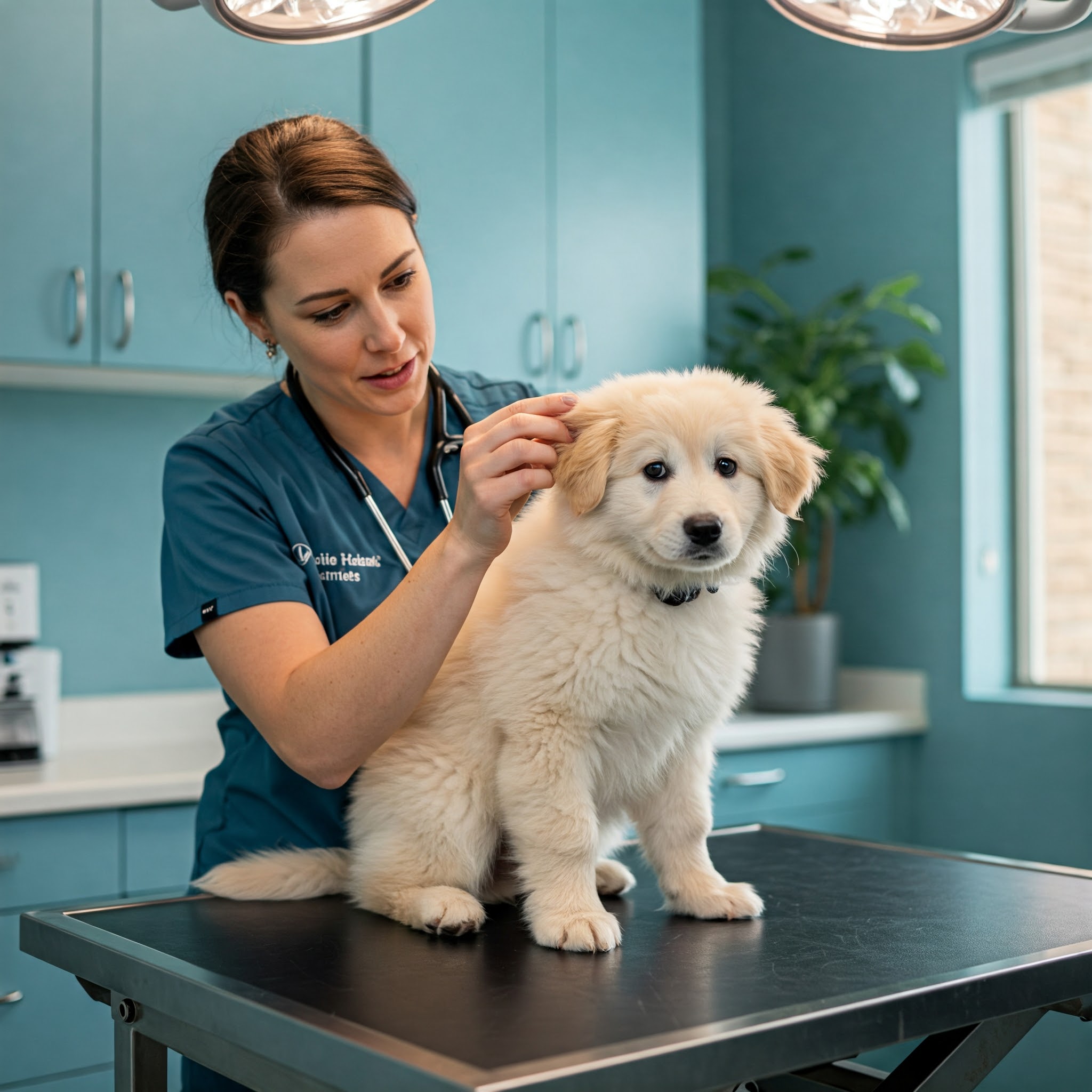Table of Contents
Did you know that approximately 16.5% of dogs are found to be infected with intestinal parasites? This statistic should concern you as you are a pet owner. In these insects worms can pose serious risks to our furry companions.
Deworming is crucial for a dog’s health. It doesn’t matter if your dog is under attack or not. For every pet owner it should be as equal as their own health. They can cause malnutrition, anemia. These are highly disturbing diseases. Apart from these they can also cause gastrointestinal distress.
Regular deworming can save you from all these diseases. It will keep your pet healthy and active. How long does it take for dewormer to work in dogs? We will talk about this . We will also give more information about it. Like types of worms, deworming treatments available, and more. So stick with us.
Types of Worms
Roundworms (Toxocara canis): This worm causes vomiting, diarrhea, and weight loss. That is why it is on top of the list. It is also the reason it is the most common intestinal parasite in dogs.
Tapeworms (Dipylidium caninum): Symptoms of these worms are weight loss and visible segments. They are often transmitted through fleas.
Hookworms (Ancylostoma caninum): Hookworms attach to the intestinal wall of your dog. It feeds on blood. Because of which it causes anemia and lethargy. They are especially dangerous for puppies.
Whipworms (Trichuris vulpis): These worms make their home in the large intestine. They can cause severe diarrhea and weight loss. They are less common but still pose a risk.
Types of Dewormers
Broad-Spectrum Dewormers: They work on the different types of worms simultaneously. They are often used as a first-line treatment for suspected infestations.
Targeted Treatments: As you can see by the name they are for targeted purposes. They target one type of worm. For example, a tapeworm-specific treatment may be prescribed if tapeworms are confirmed through fecal testing.
So, How Long Does It Take For A Dewormer To Work In Dogs?
Dewormers typically start working within two to six hours after administration. This section will cover both the immediate effects and full effectiveness.
Immediate Effects
So, most dewormers start working pretty quickly. Within two to six hours! That’s right! As a pet owner, you can expect to see some changes in your pup during this time.
It’s kinda amazing how these meds work.
They paralyze the worms which ultimately kills them. Second, they mess with their head. They can no longer soak up nutrients.
This leads to their eventual demise and, well, their exit from your dog’s body.
Signs That the Dewormer is Doing Its Job
What to expect in the first few hours? Some dogs show signs that the medication is kicking in. It’s not unusual for owners to spot dead worms in their dog’s stool shortly after treatment. Gross? For sure! But seeing that evidence gave me a huge sigh of relief. “Yes! It’s working!” I thought as I cleaned up after him.
But here’s the thing: Some effects are visible pretty quickly. Some take a bit longer to show up. Patience is key!
Full Effectiveness: The Waiting Game
Now let’s talk about full effectiveness. Most dewormers start to work within hours. But you have to wait longer. For some days, it completely kicks all those worms out. The timeline can vary based on a few factors:
Type of Worm: Not all worms respond same. For example, tapeworms might break into smaller segments and be expelled gradually—yikes! Meanwhile, roundworms usually get eliminated more quickly.
Severity of Infestation: Your dog has a severe infestation. It is another factor. It might take longer for the dewormer to do its thing. I learned this with my dog. I talked to the vet and she said she needed an extra dose. After a few days some stubborn parasites were still hanging around. But in the end they all vanished.
Dog’s Health Status: Your pup’s overall health is also a big factor. Puppies or dogs with weak immune systems take time. Mine was generally healthy but still took his time bouncing back.
Factors Influencing Dewormer Efficacy
If you know what factors influence efficacy. You will have a better understanding of how long does it take for dewormer to work in dogs? Here are the key elements that affect how well dewormers work:
Worm Type and Lifecycle
Different types of worms have unique life cycles. With that their resistance to treatments changes. For instance:
Roundworms (Toxocara canis) have a simple life cycle. They are easy to treat. However, They can reproduce quickly, leading to rapid reinfestation if not managed properly.
Tapeworms (Dipylidium caninum) can develop resistance to certain medications. For these go for treatments based on their lifecycle stages.
Recent reports indicate that some tapeworm populations have shown resistance to praziquantel, a common treatment.
Hookworms (Ancylostoma caninum) and whipworms (Trichuris vulpis) may require multiple doses. You might have to use different medications because of their complex life cycles.
Studies have shown that a single treatment with benzimidazoles may not be sufficient for whipworms. That is why the vet recommend a second dose.
Dog’s Health and Age
A dog’s age, breed, and overall health significantly influence treatment outcomes:
Age: Puppies are particularly vulnerable to worms. You will have to be more careful about them. They require more frequent deworming due to their immature immune systems.
The American Animal Hospital Association recommends deworming puppies every two weeks until they are three months old.
Breed: Some breeds are more predisposed to specific types of worms. They metabolize medications differently.
For example, breeds with a history of gastrointestinal issues might respond differently to dewormers.
Overall Health: Dogs with weak immune systems may not respond as effectively to treatment. Same goes to dogs with underlying health conditions.
Their ability to clear infections can be diminished. That is why those pet owners should consult veterinarians. They will give you better deworming plans.
Dosage Administration, Post-Deworming Care And Recovery
Follow this dosage guidelines for best efficacy of dewormers:
Administ dosage according to your dog’s weight. It is important. Under-dosing can lead to ineffective treatment and contribute to the development of resistance.
Dewormers (oral tablets, liquids, injections) have varying absorption rates. Some dogs may require assistance with administering medications. Especially if they are uncooperative or if the medication has an unpleasant taste.
Post-Deworming Care
These can have side effects of deworming. You should be aware of it. Their behavior might change like this:
Mild gastrointestinal is short-lived but should be monitored. They can have vomiting or diarrhea, as their bodies expel dead worms.
Dogs might exhibit increased energy levels or improved appetite as they recover from the effects of the parasites. However, any severe or prolonged symptoms warrant a consultation with a veterinarian.
Monitor Your Dog’s Recovery
Post-treatment monitoring is essential. While you look at them you might see some side effects that you will have to cover.
Have a look at your dog’s stool. Notice the changes in consistency or the presence of dead worms. This can indicate that the dewormer is working effectively.
Consult a veterinarian if you see symptoms beyond a few days. Symptoms are severe vomiting, lethargy.
Conclusion:
How Long Does It Take For A Dewormer To Work In Dogs?
Knowing how long it takes for a dewormer to work in dogs is essential for every pet owner. Whether you’re dealing with roundworms, tapeworms, or other parasites, deworming treatments are crucial for your dog’s health and well-being. Generally, dewormers start working within a few hours to days, but full effectiveness can take up to a few weeks, depending on the type of parasite and the treatment used.
To ensure your dog’s health, always follow your vet’s recommendations for the correct dosage and treatment schedule. If you notice any concerning symptoms or if the problem persists, consult with your veterinarian for further guidance.
Taking proactive steps to protect your dog from parasites not only improves their quality of life but also prevents potential health complications. Stay vigilant and keep your furry friend parasite-free with regular deworming and proper care.






